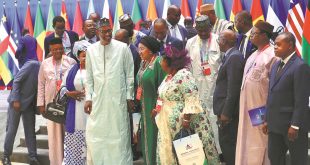Published: May 09,2024
By David Gosset

Photo taken on Oct 28, 2021 shows the White House in Washington, DC, the United States. [Photo/Xinhua]
The possibility of a change in the leadership at the White House has sparked discussions, particularly on its potential impact on China-US relations. Yet in the United States, one prevailing sentiment looms large: the persistent apprehension of China.
While the US election could make its ties with China more complicated, it is improbable that it would result in any significant change in the nature of Sino-US relationship. The underlying components of the ecosystem surrounding both incumbent President Joe Biden and former president Donald Trump remain intact, thereby sustaining the US’ established strategy of upholding dominance in global affairs, encompassing areas ranging from finance to military matters.
In the corridors of Washington, there is a palpable fear of China, one deeply entrenched in the notion that China harbors ambitions for global dominance akin to those of the US. Analysts across US institutions and organizations, from the Office of Net Assessment in the Department of Defense to the CIA, the FBI and the Department of State, appear steadfast in their conviction that China’s exercise of power will closely parallel that of the US.
Essentially, the assumption suggests that if China possessed the resources currently held by the US, it would aspire to exercise comparable levels of dominance. However, I argue that if China were hypothetically the most materially powerful country on Earth, it would utilize its power differently.
For years, I have maintained that China’s quest for what is best termed “centrality “should not be conflated with hegemonic actions. In essence, China’s goals diverge from those of the US, and it is within this disparity of intentions that lies the potential to sidestep the “Thucydides trap”. It’s imperative for the US and the West to recognize the nuances of China’s approach to power, as by doing so they could avert the perils of a zero-sum game that could potentially plunge the world into unprecedented crises.
China’s ascent on the global stage is indisputable, marked by its accumulation of power and influence. However, this need not spell the decline of the US and other Western countries. Rather than viewing China’s success as a threat, they could embrace it as an opportunity for collaboration and mutual prosperity. The primary causes of Western decline would be evidently internal, primarily stemming from an inability to maintain cohesion and a lack of collective will.
Acknowledging the distinctiveness of China’s trajectory is key. Unlike the ambitions of an expansive hegemon, China’s pursuit of centrality is determined by a necessity to maintain harmony within its own mega-society. It is also driven by the quest for economic development in order to realize the rejuvenation of the Chinese nation. China is not seeking to Sinicize other cultures, in contrast to the West’s history of Westernizing the newly encountered and later colonized regions of the world.
Furthermore, China does not embody a revolutionary force aiming to disrupt the existing status quo. Instead, its primary focus lies in advancing its extensive society toward modernization on its own terms. The accomplishment of this objective, combined with China’s considerable scale, undeniably exerts a substantial influence on the global stage.
There is still ample opportunity for the US and the rest of the West to reassess their perceptions of China. Embracing a more nuanced understanding of China’s re-emergence would not only mitigate tensions but also unlock new avenues for collaboration. A prosperous China and a confident West possess the collective talent and creativity to address the pressing challenges facing humanity.
Rather than perceiving China’s resurgence as a challenge to their dominance, the US and other Western countries can regard it as an opportunity to construct a more inclusive and fair global system. The aim of genuine leaders from China, Europe and the US should not be to undercut each other, but rather to nurture a global mindset that promotes collaborative value creation, whether material or otherwise. While some may dismiss this perspective as naive, it remains the sole path toward achieving peace and harmony.
The trajectory of China-US relations in the coming years hinges on a fundamental shift in perspective. In an era of uncertainty, further marred by the emergence of perilous conflicts, it may seem paradoxical to emphasize trust in progress. However, if the US and other Western countries acknowledge China’s unique approach to power and prioritize collaboration over competition, while China remains guided by its traditional wisdom, the world could usher in an unprecedented era of progress. It would be a time where human dignity is elevated to new heights across the globe.
The author is the founder of the China-Europe-America Global Initiative. He is the editor of the three-volume China and the World, and the creator of the Inspiring Series, a collection of books that aims to introduce China to the world.
China Daily Global
 Africa -China Review Africa -China Cooperation and Transformation
Africa -China Review Africa -China Cooperation and Transformation
